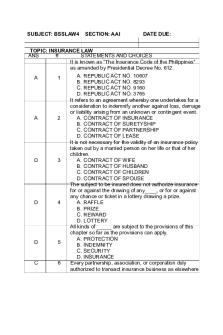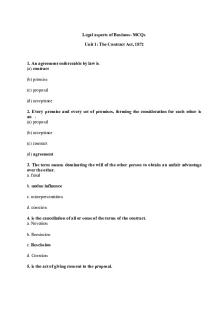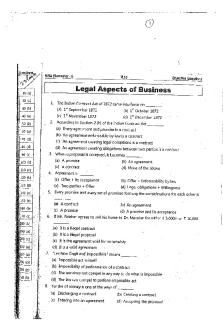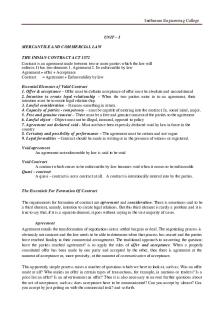LAB MCQS - MCQs on Legal Aspects of Business PDF

| Title | LAB MCQS - MCQs on Legal Aspects of Business |
|---|---|
| Author | Sanket Dhimdhime |
| Course | Mba |
| Institution | Savitribai Phule Pune University |
| Pages | 23 |
| File Size | 246.9 KB |
| File Type | |
| Total Downloads | 176 |
| Total Views | 345 |
Summary
Legal aspects of Business- MCQs Unit 1: The Contract Act, 18721. An (a) contract agreement enforceable by law is.(b) promise (c) proposal (d) acceptance 2. Every promise and every set of promises, forming the consideration fan. or each other is (a) proposal (b) acceptance (c) contract (d) agreement ...
Description
Legal aspects of Business- MCQs Unit 1: The Contract Act, 1872
1. An agreement enforceable by law is. (a) contract (b) promise (c) proposal (d) acceptance 2. Every promise and every set of promises, forming the consideration for each other is an . (a) proposal (b) acceptance (c) contract (d) agreement 3. The term means dominating the will of the other person to obtain an unfair advantage over the other. a. fraud b. undue influence c. misrepresentation d. coercion 4. is the cancellation of all or some of the terms of the contract. a. Novation b. Remission c. Rescission d. Coercion 5. is the act of giving consent to the proposal.
a. Acceptance b. Promise c. Contract d. Agreement 6. State which of the following statements is false? a. The person making the proposal is called the “promisee” and the person accepting the proposal is called the “promisor. b. Agreements, the meaning of which is not certain, or capable of being made certain, are void. c. A proposal when accepted becomes a contract. d. The normal rule of law is that unless a party has performed its promise in entirety, it cannot claim performance from the other. 7. Match the following 1. Ordinary damages A. claimed in case of loss of profit 2. Special damages
B. awarded with a view to punish the defendant
3. Vindictive damages
C. where there is no substantial loss
4 . Nominal damages
D. naturally arise in the usual course of things
a. 1-B, 2-C, 3-D, 4-A b. 1-C, 2-D, 3-A, 4-B c. 1-D, 2-A, 3-B, 4-C d. 1-D, 2-C, 3-A, 4-B 8. Quasi-contracts is a classification of a contract in terms of a. mode of formation b. validity c. mode of performance d. enforceability
.
9. State which of the statements is false? a. If the parties to a contract agree to substitute a new contract for it or to rescind it or alter it, the original contract cannot be discharged b. Act’ is a specific type of ‘law’ which is also referred to as codified law. c. There must be a free and genuine consent from both the parties, for the contract to be considered as a valid contract. d. The Indian Contract Act is based on the English Law of Contracts which is an unwritten law. 10. In India, the law relating to contracts is contained in the Indian Contract Act of . a. 1957 b. 1999 c. 1872 d. 1960 11. S agrees to sing in M’s theatre . S dies in the meanwhile the contract is a. Void Illegal
c. Voidable
d.
c. Both A & B
d. None of
b. Discharged
12. Breach of contract can be of ____________ breach A. Actual the above
b. Anticipatory
13. Minor can be an a. Agent
b. Partner
c. Surety
d. None of the above
c. Benefit
d. Acceptance
14. Consideration can simply be explained as a. Profit
b. Income
15. Inadequacy of Consideration in a Contract a. Will make it void b. Will not Make it Void illegal d. Will make it wager
c. Will make it
16. Legal relationship between the middleman and the businessperson is governed by
a. law of business None of the above
b. law of Surety
c. law of agency
d.
17. Person who is represented by the agent is called the a. Principal above
b. Principle
c. Middle man
d. None of the
18. The ______ does not usually get any rights or responsibilities under the Contract a. Principal
b. Agent
c. Surety
d. None of the above
19. ___________ of the agent is to act on behalf of principal is must a. Consideration above
b. Rule
d. None of the
c. Intention
20. Whatever a person can do personally, he can do through an agent exemption to this is a. Marriage
b. Doctor
c. Advocate
d. All of the above
(Ans: d) 21. Agent is specifically appointed by the principal for a particular task or a general function. This type of appointment is called as a. Ratification
b. Express
c. Implied
d. Necessity
22. Ratification of an Agent can be done for a a. Part of the contract b. Whole Contract b d.None of the above
c. Both a &
23. Agency when it is ratified it must be communicated to the a. Agent
b. Principal
c. Third Party
d. All of the above
25. Ratification can be done for the act which is done on behalf of a. Agent
b. Third party
c. Principal
d. All of the above
Unit 2: Sale of Goods Act, 1930: 1. Condition is a stipulation which is A. Essential to the main purpose of contract B. Collateral to the main purpose of contract C. Not essential to the main purpose of contract D. Collateral to the main purpose of contract 2. The sale of goods Act deals only with goods which are ______________ in nature A. Immovable B. Movable C. Specific D. All of the above 3. Goods that are identified at the time of contract of sale is called ________________ goods A. Specific Goods B. ascertained goods C. clear Goods D. both a & b 4. _________________ is a Stipulation which is Collateral to purpose of contract A. Condition B. Warranty C. Guaranty D. Collateral Contract 5. __________________________ is the concept of “LET THE BUYER BEWARE”. A. Information Center B. Unfair Trade Practices C. Caveat Emptor D. Buyer Kingdom 6. ___________________ and _______________ are the two parties involved in Contract of sale A. Seller & Buyer B. Agent & Principle C. Customer & Sales man D. Customer and supplier 7. It is a standard rule that risk follows ____________________
A. Seller B. buyer C. property D. Possession 8. The sale of Goods Act enforces in the year A. 1935 B. 1930 C. 1945 D. 1955 9. The subject matter of the contract under Sale of goods Act must be A. Money B. Goods C. Immovable Goods D. All of the above 10. Sale under Sale of goods Act is a/an ____________________ contract A. Executory B. Executable C. Executed D. None of the above 11. In sale the transfer of property in goods from the seller to the buyer takes place A. At the end of contract B. Immediately C. In a future Date D. Both a&b 12. In Agreement to sell the transfer of property in goods from the seller to the buyer takes place A. At the end of contract B. Immediately C. In a future Date D. Both b&c 13. Which of the following is not a subject matter in a Sale of goods Act A. Trade mark B. Good will C. Money
D. Water 14. As per Sale of goods Act Movable goods does not include A. Gas B. Growing crop C. Electricity D. Money 15.The goods must be ________ goods for transferring the property in the goods A. Ascertained B. Unascertained C. Future D. All of the above 16. The subject matter of the contract must necessarily be _____________ A. Sale B. Product C. Service D. Goods 17. A consideration in contract of sale must be ______________ only A. Goods B. movable only C. price D. Purchase 18. Transfer or agree to transfer the _____________ of the goods is the purpose of sale of goods Act A. Property B. Possession C. Value D. Usage 19. A sale is a ______________ contract A. Implied B. Executed C. Agreed D. Executory 20. An agreement to sell is a ______________ contract
A. Implied B. Executed C. Agreed D. Executory 21. A sale is said to be completed when ___________ is transferred from one party to the other party A. Money B. Goods C. Interest D. Ownership 22. In contract of sale the payment of price is __________ to the transfer of property in goods A. concurrent B. important C. mandatory D. immaterial 23. An agreement to sell will become a sale in _______________ A. Future date B. immediate effect C. 30 days D. None of the above 24. An agreement to sell the transfer of ownership is ___________ A. Definite B. Mandatory C. Conditional D. immaterial 25. A contract of sale of goods is a contract whereby the seller transfers or agrees to transfer the property in goods to the buyer for ___________ A. price B. interest C. credit D. value
Unit 3: The Negotiable Instrument Act, 1881
1. _______ means ‘something legally transferable from one person to another for a consideration’. a. Instrument
b. Negotiable
c. Negotiable Instruments
d. all of the above
2. ______ means ‘ a written document by which some legal rights are created in favor of some person’ a. Instrument
b. Negotiable
c. Negotiable Instruments
d. all of the above
3. Negotiable instrument means a promissory note, bill of exchange or cheque, payable to ___________ a. Bearer
b. order
c. either to bearer or order
d. neither bearer nor order
4. A negotiable instrument is freely transferable, by delivery if it is a/an ______________ instrument. a. order
c. both a & B
b. bearer
d. None of the above
5. A negotiable instrument is freely transferable, by endorsement if it is a/an ____________ instrument. a. order
b. bearer
c. both a & b
d. None of the above
6. The transferee of a negotiable instrument is the one a. who transfer the instrument
b. on whose name it is transferred
c. who en chases it
d. none of the above
7. The transferor of a negotiable instrument is the one a. who transfer the instrument c. who en chases it
b. on whose name it is transferred d. none of the above
8. The instrument must be taken in good faith and with a a. Interest
b. consideration
c. legal relation
d. business motive
9. When an instrument has been lost it is presumed that it was ____________ a. expired c. stolen
b. duly stamped d. misplaced
10. Which of the below given sentence is proper as to considered to be written in negotiable instruments a. I promise to pay B rs.500
b. Mr. B I.O (owe).U Rs.1000.
c. I am liable to pay you Rs.1000.
d. none of the above.
11. _________ an instrument in writing containing an unconditional undertaking signed by the maker to pay a certain sum of money only to, or to the order of, a certain person or to the bearer of the instrument a. Promissory Note c. Cheque
b. bill of exchange d. none of the above
12. ______________ is an instrument in writing, containing an unconditional order, signed by the maker, directing a certain person, to a pay a certain sum of money only to, or to the order of a certain person or to the bearer of the instrument a. Promissory Note c. Cheque
b. bill of exchange d. none of the above
13. The number of parties to a bill of exchange is _______ a. 2
b. 4
c. 6
d. 3
14. The number of parties to a Promissory Note is _______ a. 2
b. 4
c. 6
d. 3
15. Sec. 4 of negotiable instruments Act 1880 deals with
a. Promissory Note c. Cheque
b. bill of exchange d. none of the above
16. Sec. 5 of negotiable instruments Act 1880 deals with a. Promissory Note c. Cheque
b. bill of exchange d. none of the above
17. Sec. 6 of negotiable instruments Act 1880 deals with a. Promissory Note c. Cheque
b. bill of exchange d. none of the above
18. The parties of a bill of exchange are a. drawee acceptor and payee
b. banker drawee and payee
c. banker acceptor and payee
d. banker drawer and payee
Ans. a 19. __________________ cannot be a bearer instrument a. Promissory Note c. Cheque
b. bill of exchange d. none of the above
20. Acceptance is _________________ in case of bill of exchange a. compulsory c. not compulsory
b. optional d. adequate
21. Acceptance is _________________ in case of bill of exchange a. compulsory c. not compulsory
b. optional d. not necessary
22. Drawer is both debtor to one and creditor to another in case of ________________ a. Promissory Note
b. bill of exchange
c. Cheque
d. none of the above
23. Liability of maker is __________ in case of bill of exchange a. primary c. unconditional
b. unlimited d. secondary
24. ___________ is an order to pay the third party a. Promissory Note c. Cheque
b. bill of exchange d. none of the above
25. A Promissory Note or Bill of Exchange can be made payable a. On demand
b. On a specific date
c. After a specified period – months or days.
d. all of the above
Unit 4: The Companies (Amendment) Act, 2015
1. Under which section of Companies Act 2013, the term Company has been defined? 1. 2. 3. 4.
Section 1(3) Section 2(20) Section 4(2) Section 2(4)
Answer: (2) 2. What is the minimum number of persons required to form a public company? 1. 2. 3. 4.
1 2 5 7
Answer: Seven or more persons are required to form a public company
(4)
3. What is the minimum number of persons required to form a private company? 1. 2. 3. 4.
1 2 5 7
Answer: Two or more persons are required to form a private company
(2)
4. Which new type of company was introduced in Companies Act 2013? 1. 2. 3. 4.
One Person Company Two Person Company Limited Liability Partnership Public Private Partnership
Answer: (1) One Person Company is a private company which is one formed by one person by subscribing their names or his name to a memorandum and complying with the requirements of Companies Act 5. What is the maximum number of persons required to form a public company?
1. 2. 3. 4.
50 100 200 Unlimited
Answer: (4) In order for a company to be public, it should have a minimum of 7 members (maximum unlimited). 6. What is the maximum number of persons required to form a private company? 1. 2. 3. 4.
50 100 200 Unlimited
Answer: (3) Minimum of only 2 members (and maximum of 200) are required to form a private company 7. What is the minimum paid up capital required to incorporate a private company? 1. 2. 3. 4.
Rs 1 lakh Rs 5 lakh Rs 10 lakh No minimum paid-up capital requirements
Answer: (4) 8. What is the minimum paid up capital required to incorporate a public company? 1. 2. 3. 4.
Rs 1 lakh Rs 5 lakh Rs 10 lakh No minimum paid-up capital requirements
Answer: (4) The minimum paid-up share capital requirement of INR 100,000 (in case of a private company) and INR 500,000 (in case of a public company) under Companies Act 2013 has been done away with. Consequently, the definitions of private and public companies stand amended in Companies Act Amendment 2015. Accordingly, no minimum paid-up capital requirements will now apply for incorporating private as well as public companies in India. 9. What is the minimum of directors required in the case of a public company? 1. 1 2. 2
3. 3 4. 4 10. What is the minimum of directors required in the case of a private company? 1. 2. 3. 4.
1 2 3 4
11. In the subscription clause of the memorandum of association of an OPC, the member will state that he is _____________________ of the company. A. Sole owner B. subscribing to all the shares in the capital C. investing in the capital D. Proprietor 12. The Table F which is the model Articles of Association of a company limited by shares incorporates provisions of an OPC especially regarding A. Membership and nominees, B. Annual general meetings C. Board meetings D. All of the above 13. Where a member of an OPC becomes a member of another OPC by virtue of his nomination in that second OPC, he shall opt out of either one within a period of 180 days A. 3 Months B. 180 days C. 6 months D. 90 days
14. An OPC cannot convert itself voluntarily into any kind of company for a period of _____ years from the date of its incorporation unless and otherwise it achieved certain status. A. 2 years B. 3 years C. 4 years D. 5 years 15. A minor cannot become a __________ in OPC A. member B. nominee C. holds shares with beneficial interest D. All of the above 16. 1. Section 12 of Companies Act 1956, deals with a. Incorporation c. Number of Directors
b. Share capital d. Share holders
17. Minimum number of members required to apply for incorporation certificate in a public ltd company is a. 3
b. 2
c. 7
d. 50
18. The application for registration of a company should be presented to the registrar of the state in which the _______________ of the company is to be situated a. Manufacturing plant c. business office
b. first branch d. any of the above.
19. The application for registration of a company should be presented to the _______________ of the state appointed under Companies Act 1956 a. Controller
b. registrar
c. Governor
d. registration officer
20. Number of documents to be submitted, by a public ltd company, to the registrar while applying for incorporation of the company is a. 3
b. 2
d. 50
c. 7
21. The address of the registered office of the company must be notified to the registrar within _________ days of registration, if it is not done at the time of incorporation a. 15
b. 30
c. 60
d. 45
22. Among the following which documents are not mandatory to be submitted to the registrar along with incorporation application by a private company. a. Address of Registered office & undertaking capital c. statement of capital & list of directors capital
b. Undertaking and statement of d. list of directors and statement of
23. The articles of association needs to be signed by a. all proposed directors
b. registrar
c. subscribers of memorandum
d. none of the above
24. The company will be considered as separate person and different from its members from the date (when the) _____________ a. start of business
b. Apply for registration
c. receive incorporation certificate
d. mentioned in certificate
25. Number of clauses in Memorandum of Association is a. 5
b. 6
c. 7
d. 8
Unit 5: The Consumer Protection Act, 1986 1. Consumer Protection Act is significant to A) Immovable Goods B) Movable Goods C) Particular Goods and Services D) All Goods and Services 2. How many rights does a consumer have under the Consumer Protection Act A) 8 B) 6 C) 4 D) 5 3. Under the Consumer Protection Act, the rights of a consumer do not include to be A) Safety B) Choose C) Presented D) Informed 4. When the seller manipulates the price, it is known as A) Caveat Emptor B) Unfair trade practices C) Restricted trade practices D) None of the above 5. Under this act, the minimum age of forum member of a district forum should be A) 30 B) 40 C) 35 D) 65 6. The maximum age for a state commission member should be A) 60 B) 35
C) 70 D) 67 7. The maximum age national commission member should be A) 60 B) 35 C) 70 D) 65 8. Which of the following forum can reappoint the same person as to its member A) National commission B) State commission C) District commission D) None of the above 9. In which forum it is compulsory to have a female member A) National commission B) State commission C) District commission D) All of the above 10. Within how many days the opposite party has to...
Similar Free PDFs

Legal Aspects of Business MCQs
- 26 Pages

MCQ - Legal Aspects of Business
- 25 Pages

MCQs - MCQs
- 6 Pages

MCQs Business Intelligence
- 11 Pages

MCQs
- 203 Pages

Mcqs-on-BRM - mcq
- 27 Pages

MCQs -Business Communication
- 9 Pages

Business Comm - MCQs
- 30 Pages

FAFL MCQs - MCQs
- 21 Pages

Immunology MCQs - MCQs
- 15 Pages

Legal Aspects of Nursing
- 5 Pages

Topic 6 MCQs Business Law
- 94 Pages
Popular Institutions
- Tinajero National High School - Annex
- Politeknik Caltex Riau
- Yokohama City University
- SGT University
- University of Al-Qadisiyah
- Divine Word College of Vigan
- Techniek College Rotterdam
- Universidade de Santiago
- Universiti Teknologi MARA Cawangan Johor Kampus Pasir Gudang
- Poltekkes Kemenkes Yogyakarta
- Baguio City National High School
- Colegio san marcos
- preparatoria uno
- Centro de Bachillerato Tecnológico Industrial y de Servicios No. 107
- Dalian Maritime University
- Quang Trung Secondary School
- Colegio Tecnológico en Informática
- Corporación Regional de Educación Superior
- Grupo CEDVA
- Dar Al Uloom University
- Centro de Estudios Preuniversitarios de la Universidad Nacional de Ingeniería
- 上智大学
- Aakash International School, Nuna Majara
- San Felipe Neri Catholic School
- Kang Chiao International School - New Taipei City
- Misamis Occidental National High School
- Institución Educativa Escuela Normal Juan Ladrilleros
- Kolehiyo ng Pantukan
- Batanes State College
- Instituto Continental
- Sekolah Menengah Kejuruan Kesehatan Kaltara (Tarakan)
- Colegio de La Inmaculada Concepcion - Cebu



